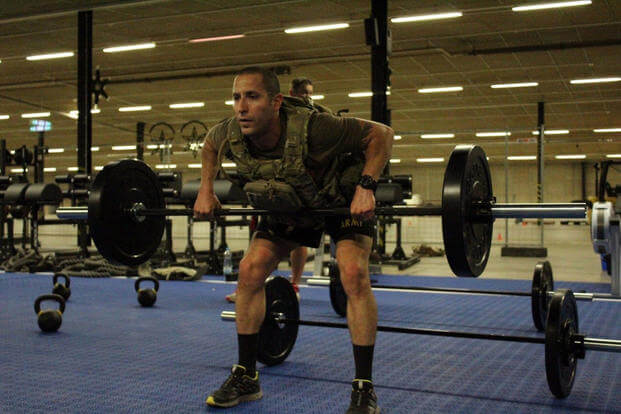If you're training for challenging special ops selection programs like BUD/S, you must have a full, well-trained arsenal of fitness elements. That means you need to have strength and power, endurance and muscle stamina, speed and agility, flexibility and mobility, grip and a certain amount of body mass to help with durability.
We all start training with some sort of natural or neglected weakness in the above fitness elements, and it is our job during preparation not only to lessen those weaknesses, but maybe to turn them into a strength.
Here is a great question about some of the many ways to train in order to prepare your body for the durability and work capacity needed in selection.
Does hypertrophy training have a place when preparing for BUD/S? Wouldn't strength training be better? - Future BUD/S student
Hypertrophy simply means growth, and hypertrophy training is focused on muscle size. A cycle of hypertrophy training can start with high-repetition calisthenics. A beginner to calisthenics will see muscle growth with calisthenics and increased caloric intake alone. Add weights to the training and keep the high repetitions, and you will build bigger muscles as well as muscle stamina (which is needed for BUD/S durability).
Build the muscle, then make it stronger. That can be done with a high-repetition calisthenics phase (or light weightlifting phase), followed by a heavier weightlifting cycle as discussed in my periodization program. A cycle of 6-8 weeks of hypertrophy will build bigger muscles. Following it with a cycle of strength training to make those muscles stronger is not a bad idea, especially if you need to lift because strength and power are your weakness.
Many endurance athletes neglect strength or hypertrophy training, and it is a big weakness that will be exposed the minute you get under a log, boat or ruck in first phase. So, yes, I would recommend strength and hypertrophy training for anyone who needs to gain weight and get stronger.
However, if you are coming from an athletic background of strength and bodybuilding training, you need to do just the opposite and work instead on your cardiovascular endurance and muscle stamina with calisthenics testing and grinder-style PT (dips, flutter kicks, push-ups, pull-ups, burpees, squats, lunges). You may not even need to lift at all if you are already big from a lifetime of lifting. You may just need to turn yourself into a cardio machine by doing more triathlon-type training. Once again, the answer to your question is: “it really depends.”
Hypertrophy vs Strength Training - BUD/S Prep
Related: Watch more fitness videos by Stew Smith
Here's a more simple breakdown on the types of training.
Hypertrophy training will improve muscle endurance, build muscle mass, burn fat and build strength as well.
Strength training is designed specifically to increase strength, build muscle and improve durability with load-bearing activity.
The terms typically are separated by the goals of the athlete. A bodybuilder will focus on hypertrophy to gain muscle size and definition. A powerlifter or athlete will do strength training for strength and explosive power by adding a velocity component to lifts, movements, running and jumping.
But truth be told, you can do either strength or hypertrophy and receive results in either or both. A larger set of calisthenics or light weight will have a muscle stamina and hypertrophic effect on a muscle (15-20, plus rep set). A smaller set of repetitions with heavier weight will yield a strength or power benefit (depending on the speed of lift or movement) on a muscle or group of muscles.
Your own athletic history will determine whether you need to add in hypertrophy or strength training as part of your preparation program for selection phase. The endurance athlete needs to add in a cycle of hypertrophy and strength training into the periodization program.
For the lifter, weaknesses like running, swimming and rucking also should be part of the training cycles. Maintaining a base of cardio endurance is critical, even while you are trying to build muscle. That means you have to eat more to make up for the caloric burn of added cardio.
Related:
Tactical Athlete -- Recruit/Candidate
Work Capacity -- What is Yours?
Stew Smith is a former Navy SEAL and fitness author certified as a Strength and Conditioning Specialist (CSCS) with the National Strength and Conditioning Association. Visit his Fitness eBook store if you’re looking to start a workout program to create a healthy lifestyle. Send your fitness questions to stew@stewsmith.com.
Want to Learn More About Military Life?
Whether you're thinking of joining the military, looking for fitness and basic training tips, or keeping up with military life and benefits, Military.com has you covered. Subscribe to Military.com to have military news, updates and resources delivered directly to your inbox.















